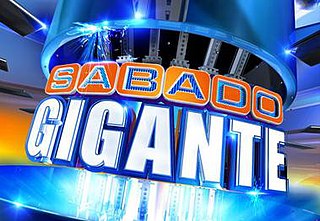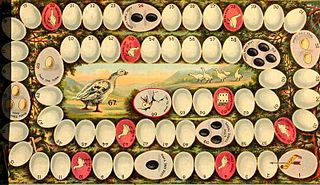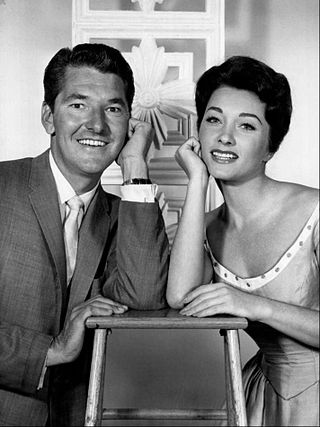
Press Your Luck is an American television game show created by Bill Carruthers and Jan McCormack. Contestants answer trivia questions to earn "spins" on a randomly cycling game board whose spaces display cash, prizes, extra spins, special items, or the show's mascot, a cartoon creature known as the Whammy. Landing on a Whammy eliminates any cash and prizes accumulated while also displaying a short comedic animation. Its format is a revival of an earlier Carruthers production, Second Chance, which was hosted by Jim Peck and aired on ABC in 1977. The original version of Press Your Luck aired on CBS between 1983 and 1986. This version featured Peter Tomarken as host, Rod Roddy as announcer, and Carruthers as both director and voice of the Whammy. The original incarnation of the show gained significant media attention in 1984 for contestant Michael Larson, who won over $100,000 after memorizing the original pattern of the game board.

Sábado Gigante is a Spanish-language television program broadcast by Spanish International Network in the United States. It is Univision's longest-running program and the longest-running television variety series in world television history. Sábado Gigante is an eclectic and frenetic mix of various contests, human-interest stories, and live entertainment. From its start in 1962, it was hosted by Chilean TV star Mario Kreutzberger under the stage name of Don Francisco. Rolando Barral and Pedro De Pool began serving as a co-hosts in 1986; that role was taken over by Javier Romero in 1991.

The Game of the Goose, also known as the Royal Game of the Goose is one of the first board games to be commercially manufactured. It is a race game, relying only on dice throws to dictate progression of the players. The board is often arranged in the form of a spiral, with game pieces starting on the most outward part. All spaces on the game board are numbered, with some depicting an illustration of either a goose or a hazard indicating a specified action. The aim of the game is to reach the 63rd space before any of the other players, while avoiding hazards such as the Hotel, the Bridge, and Death.
The Mad Dash is a television game show created by Sidney M. Cohen which first appeared in 1978 on Canada's CTV network and ran until 1981. The series proved to be a family favourite based on Canada's BBM ratings, and was also popular in parts of the northern United States, where CTV affiliates were available to Americans living near the Canada–United States border, both over the air and via cable. Pierre Lalonde was the MC, and Nick Hollinrake was the announcer for the show, which was taped at the studios of CFCF-TV in Montreal. This classic series is included in the collection of Canadian icons in the 2006 feature film Souvenir of Canada based on the book by Douglas Coupland. The series was later rerun on GameTV in Canada, from 2007 to 2010.

Beat the Clock is an American television game show that involves people trying to complete challenges to win prizes while faced with a time limit. The show was a creation of Mark Goodson-Bill Todman Productions.

Fear Factor is an American stunt/dare game show that first aired on NBC from 2001 to 2006 and was initially hosted by comedian and UFC commentator Joe Rogan. The show was adapted by Endemol USA from the original Dutch series titled Now or Neverland.

Truth or Consequences is an American game show originally hosted on NBC radio by Ralph Edwards (1940–1957) and later on television by Edwards (1950–1954), Jack Bailey (1954–1956), Bob Barker (1956–1975), Steve Dunne (1957–1958), Bob Hilton (1977–1978) and Larry Anderson (1987–1988). The television show ran on CBS, NBC and also in syndication. The premise of the show was to mix the original quiz element of game shows with wacky stunts.

Twenty-One was an American game show originally hosted by Jack Barry that aired on NBC from 1956 to 1958. Produced by Jack Barry-Dan Enright Productions, two contestants competed against each other in separate isolation booths, answering general-knowledge questions to earn 21 total points. The program became notorious when it was found to be rigged as part of the 1950s quiz show scandals, which nearly caused the demise of the entire genre in the wake of United States Senate investigations. The 1994 film Quiz Show is based on these events. A new version of the show aired on NBC in 2000 with Maury Povich as host.
Monopoly is an American television game show based on the board game of the same name. The format was created by Merv Griffin and produced by his production company, Merv Griffin Enterprises.
In the United States, Standards and Practices is the name traditionally given to the department at a television network which is responsible for the moral, ethical, and legal implications of the program that the network airs. Standards and Practices also ensures fairness on televised game shows, in which they are the adjunct to the judges at the production company level. They also have the power to reprimand and to recommend the termination of television network stars and employees for violations of standards and practices.

Whammy! is an American television game show that aired new episodes on Game Show Network (GSN) from April 15, 2002, to December 5, 2003. The series was produced by Fremantle North America, in association with GSN. The main goal of the game is to earn as much money and prizes as possible through collecting spins by answering trivia questions correctly, then using those spins on a gameboard to win various prizes and cash amounts while attempting to avoid the show's eponymous character, the "Whammy." Contestants who do land on a Whammy lose all their prizes accumulated to that point; four Whammies eliminates a contestant from the game. The program is an updated version of Press Your Luck, which originally aired on CBS from September 19, 1983, to September 26, 1986. The series was taped at Tribune Studios and was hosted by Todd Newton, with Gary Kroeger announcing. The show aired in reruns on GSN until 2017, and came back on May 11, 2020, up until October 1, 2021.

Tic-Tac-Dough is an American television game show based on the paper-and-pencil game of tic-tac-toe. Contestants answer questions in various categories to put up their respective symbol, X or O, on the board. Three versions were produced: the initial 1956–59 run on NBC, a 1978–86 run initially on CBS and then in syndication, and a syndicated run in 1990. The show was produced by Barry & Enright Productions.
Peer Pressure is an American television game show where youths performed stunts and answered questions about moral dilemmas. The show aired in syndication from 1997-1998 in first-run, and was hosted by Nick Spano and Valarie Rae Miller.
Illinois Instant Riches is a lottery game show airing in the state of Illinois, as well as nationally on Chicago-based Superstation WGN-TV. The show was hosted by Mark Goodman, with Linda Kollmeyer as his co-host and Bill Barber as announcer.

Video Village is an American television game show produced by Heatter-Quigley Productions, which aired on the CBS network in daytime from July 11, 1960, to June 15, 1962, and in primetime from July 1 to September 16, 1960. It was notable for the use of its unique "living board game" concept and for premiering soon after the quiz show scandals.

Wheel of Fortune is a British television game show based on the American show of the same name created by Merv Griffin. Contestants compete to solve word puzzles, similar to those used in Hangman, to win cash and prizes. The title refers to the show's giant carnival wheel that contestants spin throughout the course of the game to determine their cash and/or prizes.

Dog Eat Dog was an American game show, which originally ran from June 17, 2002, to August 26, 2003. It was based on the UK version of the show by the same name. It was hosted by Brooke Burns, and had contestants compete against each other in physical competitions, trivia, and other assorted games for a prize of $25,000.

Un, dos, tres... responda otra vez, usually shortened as Un, dos, tres..., and named Un, dos, tres... a leer esta vez in its last season, was a Spanish prime-time television game show, created by Narciso Ibáñez Serrador, which was broadcast on La Primera Cadena of Televisión Española for ten seasons from 1972 to 2004.
The Chase is an American television quiz show adapted from the British program of the same name. It premiered on August 6, 2013, on the Game Show Network (GSN). It was hosted by Brooke Burns and featured Mark Labbett as the "chaser". A revival of the show premiered on January 7, 2021, on ABC. It is hosted by Sara Haines and initially featured as the chasers Jeopardy! champions James Holzhauer, Ken Jennings, and Brad Rutter. Labbett returned as a chaser in June 2021, before stepping down in 2022 along with Jennings. In their place are Buzzy Cohen, Brandon Blackwell, and Victoria Groce.
Monopoly Millionaires' Club is an American game show that debuted in syndication on March 28, 2015. Hosted by stand-up comedian/actor Billy Gardell, best known for his role as Chicago police officer Mike Biggs on the sitcom Mike & Molly, it was initially based on an unsuccessful drawing game of the same name that was coordinated by the Multi-State Lottery Association (MUSL), using the Monopoly board game brand under license from Hasbro. The lottery game returned, in scratch-off form, in the spring of 2015.












